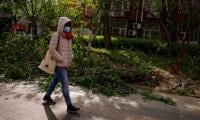NEW DELHI: Despite being poorer and more densely populated than China and having a shakier healthcare system, India has officially recorded only 81 cases of the coronavirus and just one death.
This has raised hopes that the virus that has infected more than 130,000 people and killed 5,000 worldwide might largely pass the world's second-most-populous nation by.
But with only about 5,000 Indians tested, some experts doubt the official figures and warn that if there is a major outbreak, the country of 1.3 billion is woefully unprepared.
"It's hard to imagine there are only so few cases in India," Ashish Jha, director of the Harvard Global Health Institute, told AFP.
"India's a big country where a lot of people live in very close, compact spaces. It is unclear to me why India would somehow magically skip this pandemic."
India on Friday imposed some of the world´s toughest border measures in the current crisis, barring most foreigners and suspending visa-free access for millions from the vast diaspora.
Those arriving, including Indians, who have travelled to virus hotspots such as China and Italy must be quarantined for 14 days. At land borders there is "robust screening".
More than a million air passengers have been screened and authorities have stepped up efforts to identify those with the virus and people in contact with them.
Hotels in tourist destinations such as Rajasthan have told foreigners to get health certificates. "We waited two hours at a hospital," a woman named Selina from Germany told AFP.
All mobile calls begin with a recorded health message, preceded by coughing, while social media, newspapers and television carry advice.
Top sports events are being played to empty venues, while the start of the Indian Premier League -- cricket´s most lucrative competition -- has been postponed.
Masks and hand sanitiser have sold out in many chemists and online.
"We are running 24 hours to produce as much as we can," said Ashish Kotadiya at a mask factory in Ahmedabad.
Domestic flight bookings have plunged 16 percent and tickets are on sale for under $15 on many routes.
Firms such as Google in Bangalore have asked staff to work at home, while Chinese phone maker Xiaomi, India´s top brand, has cancelled new product launches.
"One girl was tested positive for coronavirus and hence my entire team at Accenture is working from home," said Vaishnavi S., an employee with the consultancy in Pune.
Prime Minister Narendra Modi tweeted that India could "break the chain" in the spread of the virus, but in many ways the country is a paradise for infectious diseases.
Some 70 million people live in extreme poverty, many in teeming unhygienic slums where working from home or "social distancing" is not an option.
Around 420 people are crammed into every square kilometre of India compared to 148 people in China. Millions also move about internally to find work.
Health spending is among the world´s lowest at 3.7 percent of GDP, according to Bloomberg News. Some 70 percent of Indians live in rural areas where healthcare is patchy.
Some experts say India is not doing enough to create awareness about the coronavirus or to reduce public gatherings.
Holi, the recent Hindu festival where people smear paint on each other´s faces, still saw big crowds in many places. Wedding season also appears largely unaffected.
There has been some distinctly unscientific advice, with one government ministry pushing homoeopathic and ayurvedic medicine, and social media awash with disinformation.
Some lawmakers from Modi´s party have extolled cow dung and urine, while the chief minister of the most populous state, Uttar Pradesh, suggested yoga could offer protection.
Jha said India should be testing many more people at its 52 facilities nationwide.
South Korea has been conducting around 10,000 tests per day, or 220,000 in total as of Wednesday, more than 40 times that of India.
But K. K. Aggarwal, a former Indian Medical Association president, said the official number of those infected is "absolutely correct" and that India is doing enough.
"The practice is to examine symptomatic patients," as is the case for example in Iran and Italy, Aggarwal told AFP.
And India´s healthcare system has shown itself capable before.
During an outbreak of the much deadlier Nipah virus in Kerala in 2018, deaths were kept to 17 and human-to-human transmission successfully contained.
"I am quite hopeful that in another 10-15 days things will settle down," said Rajan Sharma, national president of the medical association.
The coming hot season may help, Aggarwal added.
"SARS and MERS all reduced when summer came. Maybe the heat and humidity will kill the virus," he said.
Boxes of Tecentriq from Genentech are seen at the Huntsman Cancer Institute at the University of Utah in Salt Lake...
Tahawwur Hussain Rana , 66, was brought to India from the United States on Thursday. — AFP/File NEW DELHI: Indian...
Towana Looney is seen in NYU Langone Hospital in New York on December 11, 2024, just weeks after receiving a...
Germany's Defence Minister Boris Pistorius, Ukraine's Minister of Defence Rustem Umerov and Britain's Defence...
US envoy Steve Witkoff meeting Russian President Vladimir Putin in Saint Petersburg. — AFP/FileMOSCOW: US President...
A statue of Lady Justice at the Court of Final Appeal is pictured, in Hong Kong, China, September 5, 2023. —...







